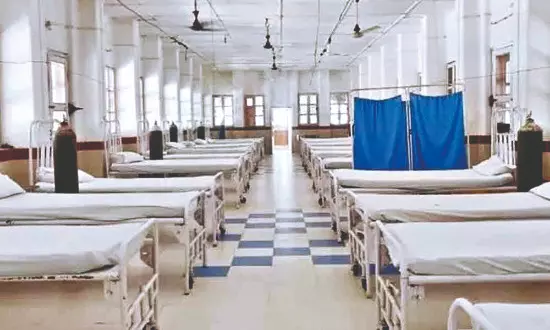Public hospitals struggle as staff burn out

New Delhi: Delhi’s public hospitals, the lifeline for thousands of underprivileged patients, are grappling with a quiet but deadly crisis, an overburdened workforce that may be unintentionally putting patient lives at risk. As reports of problematic medicines surface in government-run facilities, experts point to a deeper, systemic issue, administrative fatigue, staff shortages, and weak internal monitoring.
While frontline workers are doing their best under immense pressure, the absence of adequate checks in the system has led to serious lapses. A recent case highlights this growing concern. A complaint submitted to the Directorate General of Health Services (DGHS)
flagged serious adverse reactions from an injectable iron supplement, Iron/Ferric Carboxy Maltose 500mg/10ml, supplied by BDR Pharmaceutical International Pvt Ltd.
The drug, used in two major facilities, reportedly triggered allergic responses and other adverse drug reactions in some patients.
Another alarming observation came from Govind Ballabh Pant Hospital, where a fungal mass was detected inside a 500ml Ringer Lactate Pack Injection manufactured by Swaroop Pharmaceutical Pvt Ltd/Sanyog Life Care. In both instances, the DGHS intervened and dispatched special samples for lab testing to an NABL-certified facility.
Hospital administrations have now been asked to either withhold or closely monitor the use of the affected medicines until further notice. These directives were issued on June 27, 2025. Yet, medical professionals say such late-stage interventions are often a result of hospitals being too stretched to maintain internal vigilance.
A senior doctor from one of the hospitals, requesting anonymity, said, “Most of us are working double shifts. Routine safety audits, medicine batch checks, and inventory inspections fall by the wayside when you’re simply trying to keep the OPD moving and emergency rooms under control.”
Delhi’s Health minister, Dr. Pankaj Singh, recently acknowledged the cracks in drug quality assurance. “We have collected 100 samples of cancer medicines from various sources. They’re undergoing testing, and strict action will be taken against anyone responsible for supplying compromised drugs,” he said at a press briefing last week.
However, many inside the healthcare system argue that reactive measures are no longer enough. What’s missing, they say, is a reliable, proactive mechanism to detect quality issues before they reach patients.
Experts believe this issue stems not just from vendors or suppliers but from an overstretched public health system that lacks the capacity to supervise procurement and distribution rigorously. In some hospitals, a single pharmacist handles the workload meant for three. In others, record-keeping is still manual, making traceability of drug batches slow and error-prone.
“If your system is designed only to respond to disasters, not prevent them, then patients will continue to suffer,” said a senior healthcare expert.
As Delhi awaits lab results and official decisions on the tainted drugs, the larger question remains, how many more red flags will be missed while overworked medical staff struggle to keep up? The issue is no longer just about faulty medicines, it’s about a fragile system in urgent need of reform.



